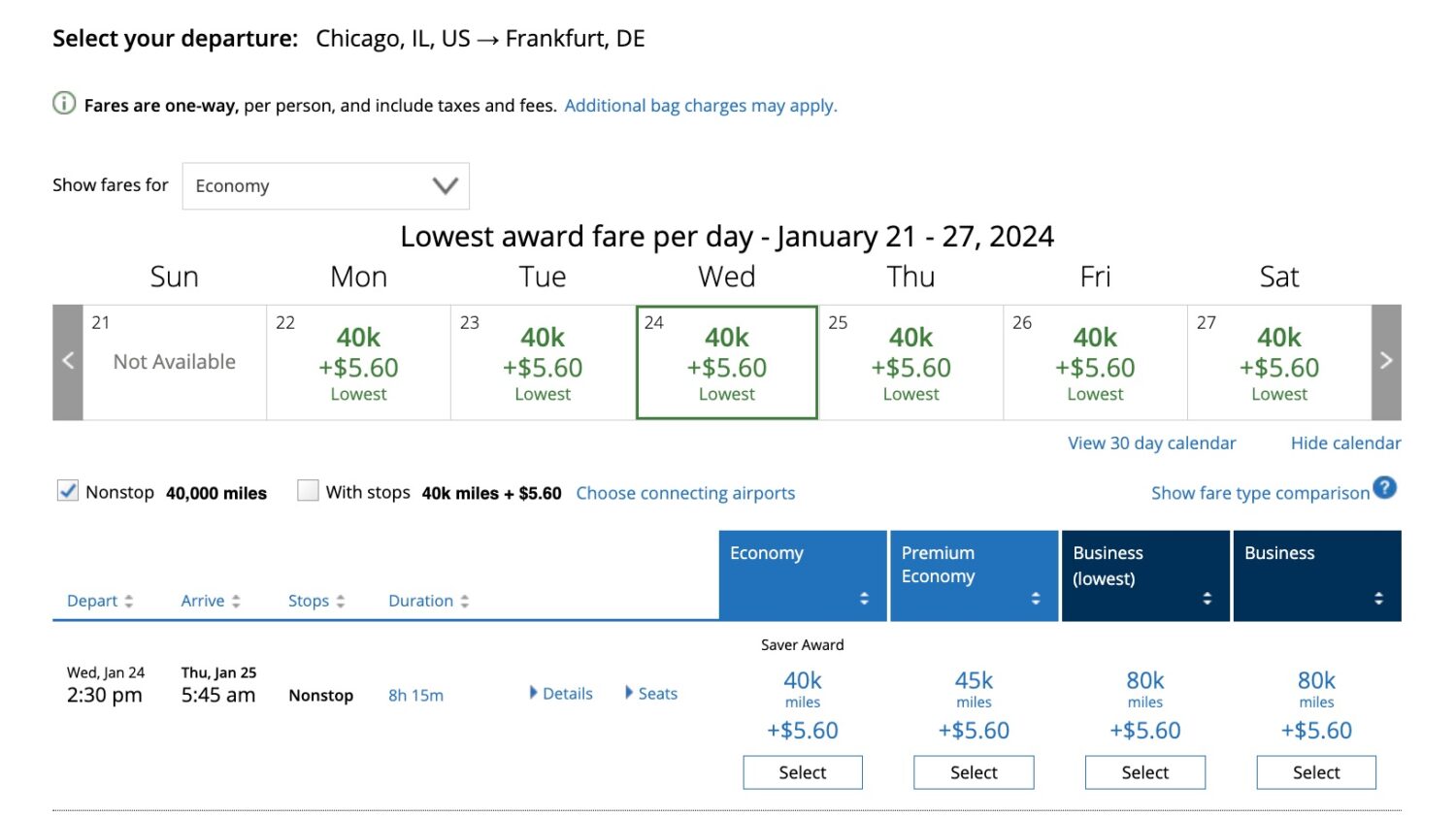Update: United has since rolled back some of these increases, bringing business class redemptions on partner airlines to 88,000 miles each way
Don't let Delta get all the credit for sudden devaluations: United just raised award rates to Europe by as much as 33% or more, whether you're flying United itself or using their MileagePlus miles to book with a partner airline.
United axed its award charts – the cheat sheets that determine how many miles you need to fly from point A to point B – years ago, but pricing has remained fairly stable. If you could find the lowest-priced “saver” award rates, you could book a seat in United economy to Europe for 30,000 miles each way or 60,000 miles in United Polaris business class. Partner awards with airlines like SWISS, Lufthansa, or Turkish Airlines were pricier but still reasonable: 77,000 United miles each way for business class, sometimes a bit less.
That's no longer the case. Across the board, United has raised award rates to Europe – in both economy and business class. Here's a brief glance at what we're seeing:
- United economy awards at the old saver award rates have increased from 30,000 miles to 40,000 miles each way (or sometimes a bit less) – an increase of as much as 33%
- Flying United business class across the pond at saver rates shot up from 60,000 miles to 80,000 miles each way – another 33% increase
- SWISS business class redemptions that once regularly cost 73,000 to 75,000 miles each way now clock in at 97,100 miles or more
- Flying economy or business class with Lufthansa, Turkish, TAP Air Portugal and other Star Alliance partners now requires an extra 33% miles, too
- Only Lufthansa First Class redemptions (which are notoriously difficult to book, anyways) remain unchanged at 121,000 United MileagePlus miles each way
For example, here's a look at what you'll find on most United-operated flights to Europe now: At least 40,000 miles for an economy seat and 80,000 miles for a seat in business class. United's dynamic award pricing – tied largely to the cash price instead of a rigid award chart – means you may see much, much higher prices, but these are the lowest rates you'll find now.

The hit to partner award bookings is equally brutal. For example, this exact same business class redemption from New York City (JFK) to Geneva (GVA) with SWISS cost just 73,000 United miles a few days ago. Economy award rates are up here, too.

Booking within the last few weeks before departure, you'll see even higher rates – but that's been the case for years. United's steady move toward dynamic award pricing means you might see some exceptions and could save a bit more by booking roundtrip instead of one-ways. But the general takeaway is obvious: Getting to Europe will now cost you substantially more United miles.
So far, we've only seen these increases hit transatlantic routes to Europe and not other destinations like South America, Asia, Australia, or even spots like Tahiti (PPT). But the writing is on the wall: It's only a matter of time before United raises award rates across the globe.
It's unclear when this devaluation began to roll out, but the higher business class award rates are new – and came without a word of warning from United. This same Turkish Airlines business class redemption from Washington, D.C.-Dulles (IAD) to Istanbul (IST) cost 77,000 United miles yesterday.

What's Happening & What You Can Do
Think of it like inflation for airline miles: After travelers hoarded points and miles throughout much of the pandemic, airlines eventually decide to increase award rates to offset that imbalance. And since United ditched its award charts – first for its own flights, then for partner airlines – that's fairly easy to do … much to the chagrin of flyers who have been saving those United miles for a trip to Europe.
Delta might have written the book on airline devaluations like this with constantly changing award rates and exorbitant business class pricing, but United and even American Airlines may not be as far behind as travelers think. Both airlines have been moving steadily toward tying award rates when using miles closer to the cash price. It'll take years for those two airlines to catch up, but don't count them out.
Luckily, there's relief for flyers who have credit cards with transferrable points from banks like Chase, Amex, and Capital One. You can transfer your points and book these same flights using another Star Alliance program like Air Canada Aeroplan, Avianca LifeMiles, or Turkish Miles & Smiles. Those airline programs have long offered a better deal for booking these same flights – and now, the gap is even wider.
For example, you could transfer 80,000 points from a card like the Chase Sapphire Preferred® Card to your United account to book a one-way flight from Newark (EWR) to Frankfurt (FRA) in business class … or you could save 20,000 points and transfer 60,000 points to Air Canada instead. Both Air Canada and United are Chase transfer partners.

Don't want to use more than 100,000 miles for a one-way business class flight to Istanbul? No problem: You can book that exact same fare for less than half the points using just 45,000 miles from Turkish Airlines, which is a Capital One transfer partner and Citi transfer partner.

Bottom Line
Death, taxes, and airline mileage program devaluations.
Those are three certainties in life, and United provided yet another reminder by hiking award rates on almost any flight to Europe by roughly 33%. This was unannounced, and it stings.
But this is why we urge people to stop waiting and start redeeming their miles. The next painful increase like this one is just around the corner.
